#I know that his feelings of stagnation will fuel his resentment
Text
The symbolism of Syril Karn trading in a brown shirt for a suit and tie...
Sure, the metaphor shows how he's just a number; one of millions of similarly dressed drones going about their mind-numbing work in an authoritarian culture that prizes their assimilation and their compliance, but it comments on so much more than the authoritarian nature of capitalistic work culture. This show is constantly reinforcing with giant-fucking-arrows and flashing lights that Karn is a fascist, and the brown shirt is yet another example. It is far from subtle.
Watching a brown shirt trade his uniform for a suit and tie isn't symbolic of him "hanging up" the uniform (fascism) and "turning a new leaf" (giving up the ideology). Rather, it is reflective of a real-life phenomenon: the "new" uniform of White supremacy. And this phenomenon actually reflects an old trend: the link between fascism and western business fashion and western fashion designers. It also reflects the emphasis put on conformity in authoritarian systems and under white supremacy.
The run-of-the-mill fascist does not wear a brown shirt (in Italy's case, it was black shirts) or even a white hood. He presents himself as a "professional," he recruits in a suit and tie. Fascists go to lengths to embrace western business fashion, a fashion already dedicated to sterility and whiteness, to give themselves an air of supposed "respectability." Because a man in a suit, working an average job and coming home every night to take care of his mother surely isn't a threat, right? Surely he's a morally upright and honest man. Right?
The suit and tie-- or the khakis and polo-- just serve to help someone blend in. Their image is carefully manicured; tailored for the white supremacist power structure. The uniform is designed to achieve complete assimilation. The alt-right uses style to legitimize itself, disarm opponents, and expand their acceptability, leading to the impression of them and their ideology being mainstream.
They want you to believe that they're the same people we'd go to church with on Sundays, sit next to at the community potluck, or even invite over to dinner.
#Andor (2022)#Andor Spoilers#Syril Karn#I know that his feelings of stagnation will fuel his resentment#and his anger will turn toward others#others who are not#beholden to the fascist power structure
11 notes
·
View notes
Note
"Life Itself" by Glass Animals reminds me of an AU in which Stu never met Murdoc and just stayed in Crawley. If Stu ever saw what he became like in this timeline, I wonder if he'd still miss his old life.
(I'm sorry that I have to stamp late apologies on all of the asks right now! It's a bit of a mad time of year and I can get a bit spacey when I sit down to answer.)
I'm not familiar with this song, but the lyrics are fairly interesting! It posits that the father is coddling while the mother is disparaging, which is an uncommon dynamic, it's a unique choice to write from that perspective. I know it's not the point of the question but just idling on the subject-- I tend to see Rachel as almost tragically forgiving toward Stuart, indulging the habits she helped form, never quite at peace nor falling to pieces for his shortcomings. She sees the best in him and doesn't quite let slip the thought that he's been at all held back from his best. David on the other hand is never harsh, never punishing or unkind to his son, but he isn't warm and open and praising either, not the picture of gushing idolization of the child. I think they have a disconnected sort of love between them because David doesn't need greatness from Stu, but that thought has formed chiefly because he does not expect it. A life beyond mechanical work or keyboard repair is not a life David has ever humored as a realistic outcome. Anyway! I like these lines especially:
I'm waking up, lost in boxes outside Tesco
Look like a bum sipping codeine Coca-Cola
That's a great speculation, and the answer, you assume, is that it's always better not knowing. You assume seeing the reality of it is something Stuart does not face, for there's no worldly thing that can make him accept a possibility that does not flatter him as the reality. I think that is the appeal of the unachieved and the unknown, and that keeps Stuart tethered to this weight of half-baked regret and never full-hearted graciousness. It allows Stuart that indulgent freedom to mope, to blame, to resent, to wish-- there is nothing but a borderless expanse of greener fields, because that is what fuels the spiral.
Despite saying that, I think that on some very private level he knows-- not "knows this is likely," I don't think he wants to believe anything less than happiness is "likely" under different circumstances, but knows that this could have been. Knows there's a hair of a chance that he fizzles and stagnates, that he never finds genuine purpose, that he stops bringing girls 'round his because it's harder to reconcile how little he has for them, that everything he's accomplished now is due to his misfortune meeting Murdoc and undoing that pulls a pivotal jenga brick from the tower's base.
And still, there are days he'll think he'd prefer it. I think Stuart's struggle, and the most compelling character arc he could've had, would be confronting this cloudy-headed sullenness, this insatiable appetite for discontent; not an arc of forgiveness or redemption for Murdoc's wrongs, but of Stuart choosing the distance, keeping his back to bridges that are littered with matches but the stone stands unburnt, and growing into a resigned acceptance that wants, thoughts, dreams, escapes, they have no weight and gripping onto them is like gripping at air. Harder still is the acceptance that cutting yourself free of an anchor doesn't change that. The rope doesn't catch on something that never existed, and instead it hangs in the space where once you stayed fastened, your life now aimless and your desires nomadic. And maybe you want that, you think. Maybe you should settle in the feeling, in the lack of it. Maybe being lost is better than sinking. And the thing is, there isn't a rejection or confirmation of that; there isn't an answer to it, not one that sits well. I think in that arc, there ceases to be a point in stewing on whether he's better off without Murdoc, because being "better"-- as he is, with his experiences, his memories, his hands and head and all they've held between them-- may not be something Stu's able to see the shape of anymore.
0 notes
Note
Hi! If it’s not too late to ask, could I please request Vil, Jamil, and Cater with an s/o who is super talented at writing, but has no confidence in their stories because a relative destroyed their self-confidence? Btw, I love your blog! You’re my favourite TWST writer😊
***Mild spoilers for every character’s backstory!***
Curiouser and Curiouser...
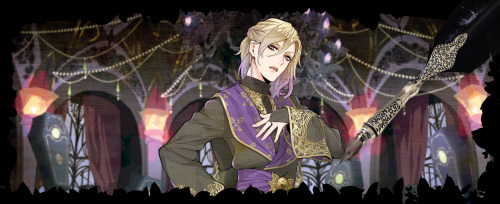
As one who is constantly in the public eye, Vil knows that support (or lack thereof) can really impact morale and motivation. While his father has supported his involvement in the entertainment industry, Vil has gotten his fair share of negativity and hate, simply due to the reach of his stardom, so he knows firsthand it doesn’t feel good.
His best advice to you? “Enjoy yourself, and what you do. You won’t be able to please everyone--that’s simply a fact of life--but fixate on the naysayers, and you will no longer be able to find joy. There are many others who will appreciate and applaud your work, if only you would give them a chance.” Vil smiles, patting you encouragingly. “Come now, pen in hand, and best face forward.”
Vil has learned to grow thick skin and to not let ugly words get to him, but he knows this may not come as naturally to others, such as yourself. Just as one nasty comment alone doesn’t immediately breed low self-esteem, Vil is aware that one nicety won’t automatically “fix” you. A slow and steady diet of support is what you need to get back on your feet again, and Vil’s there to provide that for you.
He’s of the mindset that constant flattery holds little merit and breeds dependency rather than confidence. Because of this, Vil won’t blindly praise or compliment everything you make. You may be a talented writer, but to Vil, there’s always room for improvement, and you should never be satisfied with stagnation.
His eye for detail comes in handy when pointing out plot holes and continuity errors--but no matter what he catches, Vil remains kind and constrictive with his criticism. He aims to help you improve, not tear you down as your relative has.
When you’re stuck on writing certain parts, Vil reads your draft out loud to help you gauge the flow of the story. He makes for a great narrator, and his acting abilities really bring your characters’ dialogue come to life. It’s as though Vil is putting on a private performance, acting his heart out just for you.
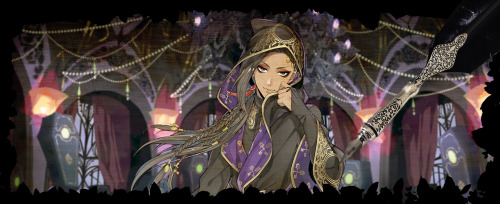
You and Jamil are birds of a feather. He, too, was discouraged from showing off his abilities--and by his own parents, no less! He still feels quite resentful about that facet of his childhood, and that bitterness makes itself well known when he learns of your circumstances.
“Restraining talent, purposefully holding back... It’s a scenario I’m familiar with. If there is anything I have learned from it, it is that you must continue to hone that talent in spite of what others may say,” he advises. “And if scorn or ridicule should come your way, then do as I have and relegate your skill to the shadows. Keep it, guard it, polish it... like a fine jewel, and allow only your closest confidants near.”
Jamil encourages you to channel your frustration into your craft. According to him, you may as well put that energy to some use rather than sit on it and sulk. Let spite fuel you, he whispers--a snake’s forked tongue in your ear. Make a masterpiece. Prove them all wrong.
When he knows you’re planning to sit down and write, Jamil ensures the environment is a quiet and peaceful one for you. He lights incense to bring a pleasant aroma to the room (or, if it gives you a headache, opens the window to let fresh air in), and provides a small plate of fruit (speared on toothpicks) for a healthy and non-messy snack to keep your energy up.
With time, Jamil ends up being your proofreader and editor. As Kalim’s caretaker and party planner, Jamil is very pragmatic when it comes to details. He’ll let you know certain points are unrealistic or require further research to more accurately portray--in fact, he’ll accompany you to the library and help you look up reference materials!
He snidely jokes that now he’s finally able to demonstrate his abilities--and how fitting, he’s lending his power to help you, someone in a similar situation as him. Jamil doesn’t even see these tasks as work. Instead, they’re oddly liberating bonding experiences for the two of you.
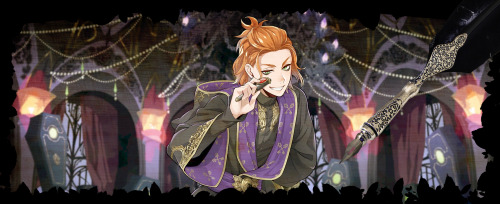
Cater’s been on Magicam long enough to know about the toxicity and bullying that sometimes takes place online. From that alone, Cater can only imagine what it must be like to walk in your shoes--it can really harm someone mentally, especially when it’s coming from family!
“It’s best to not pay too much attention to that kind of stuff, (Y/N)-chan!” Cater reassures you with a sunny smile. “It’ll really bum you out and weigh you down. Let’s try to get your mind off of that and thinking happy thoughts again~ Just leave it to Cay-kun to make it all better, okay?”
He’ll do what he can to help inspire you and get your creative juices flowing! (Look at this moodboard he put together--doesn’t it just speak to your soul? And check out this cafe with the cute ambiance! You two should definitely go together and experience it for yourselves~)
To help you slowly rediscover your confidence, Cater decides to start off small and work your way to bigger pieces! He’ll give you random one word prompts and tell you to try writing something inspired by it. The twist? You’re only allowed a small number of characters or letters maximum for it--just long enough for a social media post. Next, Cater might send you a string of emojis and ask for a few posts’ worth of words, then maybe a photo with the challenge to write a short story inspired by that image...
Of course, he always eagerly reads your work each and every time you’ve completed one. His comments may not be super in depth or analytical, but he can tell you’ve put your heart into everything you write, no matter the length or the inspiration, and Cater cheerily praises you for your efforts.
It’s difficult to get his façade to crumble, but there’s a few times when he genuinely comes close to tearing up from reading your works. The way you convey emotions in writing--whether with a few words or with many words--strikes a cord with him. As you gradually open up again to the world of writing, so, too, does Cater gradually open up about his own dark feelings that he so readily stashes away. You share your stories, and Cater shares his emotions--equal parts give and take.
#twst x reader#Jamil Viper x Reader#Jamil Viper#Vil Schoenheit#Vil Schoenheit x Reader#twisted wonderland headcanons#twisted wonderland#twst#Cater Diamond#Cater Diamond x Reader#Reader#self insert#curiouser and curiouser#spoilers
314 notes
·
View notes
Note
Is Hina in love with Ren?
hi anon, thanks for asking! it's kind of complicated, a yes and no. i think she was very young when she met ren and was figuring herself out. she was a bit softer then, though still very independent. she's always had to be strong, having little support from her family, and a very bad relationship with her father. finding a man like ren, that is so opposite of the men she grew up with, was sort of like a saving grace. even though ren technically "did everything right" after getting her pregnant, there is resentment. like ren, her body is her main source of income, and she feels he "ruined her" by convincing her to have a baby. it's not an intentional feeling, and she suffered from a lot of postpartum that was left untreated.
she and ren are both alcoholics, and their current relationship is fueled by nostalgia, sex, and having the permanent bond of a shared child / semi-shared custody. she loves kyosuke, and in her own way she loves ren, and she even has a relationship with his mother ... but it just was never in the right time, place, or position to "work".
on a surface level, they are very compatible. an attractive couple with a relaxed father and a fierce mother, they compliment each other's strengths and weaknesses by personality, but at the same time, that also doesn't work in their favor. hina can bowl ren over easily and can get whatever she wants from him.
she relies on him, and he relies on her emotionally. in his own way, ren likes the way hina treats him, which is why he keeps going back. he wishes they could be a family, and i think she does as well, but it's just never been "like that". she also readily manipulates ren, and he lets himself be goaded into her traps. imagining ren with another woman (or person) is something that really bothers her, which would be the same for him. right now things have "always been like this" since they broke it off "for good" about a year after kyosuke was born. since then it's been a stagnate stalemate of fight, fuck, ignore, bombard (text, call, etc), fight, rinse / repeat, rinse / repeat.
tl;dr -- she loves ren, but i don't think they (together) know what "being in love" is (with him). they love each other, but it's a love of necessity, of nostalgia, and can be a very toxic love.
it is one last thing to note that is interesting, and that is that they canonically do end up with other people.
5 notes
·
View notes
Text
“Go. Just take him.” The cycle of Revenge in The Last of Us Part II
MAJOR SPOILERS FOR THE LAST OF US PART 2
Spoilers + screenshots under the readmore!
Some thoughts on The Last of Us Part II
The Last of Us Part II threw me for a loop in subtle, nuanced, deep, and impactful ways. It was a story of loss and hate, resentment and grief, and the major theme: The Cycle of Revenge.
These themes all come together in the last fight between Abby and Ellie– which, before I delve into some kind of analysis, made me cry. It was honest in its delivery, resonant in its pain. It seemed Ellie wasn’t just fighting Abby, but herself in a sense. And because we had played a big part of the game as Abby, I felt a hesitance to fight Abby to the death. It doesn’t feel victorious-- plainly put, it felt “bad” to fight Abby, and in another sense, it felt futile.
I have a soft spot for storytelling, and there’s always been something about The Last of Us which touched me, probably because it focuses on the complicated nature of what’s morally right or wrong. At the game’s beginning, I wasn’t completely sold on Abby’s storyline. I could tell that Naughty Dog was trying to show a neutral grey area, that there’s no black and white, no true heroes and villains. I think alot of stories are going with this direction now, some poorly (i.e. a villain gets an underserved or forced redemption arc), but The Last of Us Part II treated its characters less like heroes and villains and more like human beings who are capable of good and evil, capable of bravery, selflessness, indoctrination, and antagonism.
The list could go on. The world of The Last of Us strives to mirror our own world to the best of its ability. It asks “what could go wrong in a post-apocalyptic world”, then in the same breath, “but what is beautiful and meaningful in such a world too?”
As the story progressed, I saw parallels between Ellie, Abby, and Joel. I saw the message as ‘destruction in revenge’; but also, by having two protagonists, one of which I should have been led to despise, I came to see each person as a “main character” of their own story, as we are main characters of our own lives, or stories, due to the limits of our perception. Abby’s world is different from Ellie’s, but there’s overlap, enough to see them as a reflection of each other. And as I’ll delve into, their story arcs follow similar paths, as they’ve both experienced loss which left them incapacitated, except... Abby’s story is about redemption, while Ellie’s is about hate and revenge.
This final fight, the scene near the end of the game, struck me for a number of reasons.
The location of the fight has significance, as the ocean represents our subconscious, and the fog represents disillusionment and confusion. Ellie had buried memories of Joel, both good and bad, into her subconscious. That was her way of dealing with the pain. She buried the pain “underwater” so to speak, into an underwater oceanic subconscious.
In that scene, she is surrounded by an “ocean of grief.”
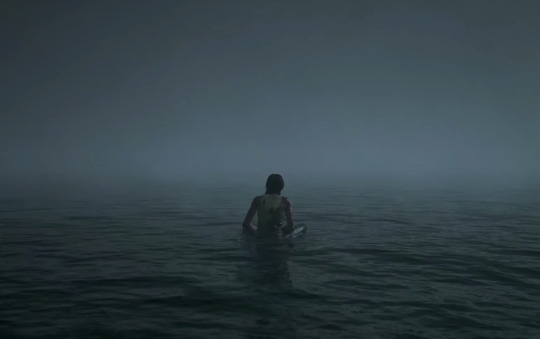
It resurfaces to Ellie in dreams throughout the game. PTSD flashes of memory too.
Ellie went after Abby a second time, and engaged in a fight with her. Abby, starving and weak, could hardly fight back. At the last moment with Abby’s head underwater, as she was drowning, Ellie sees an image of Joel– happy, safe, alive.
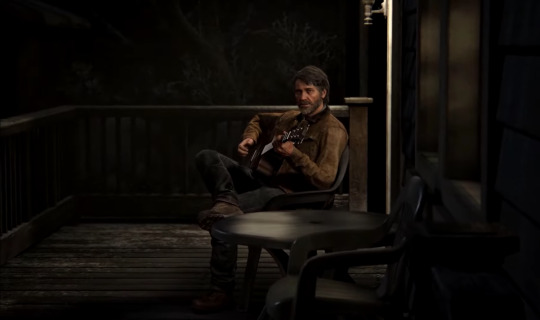
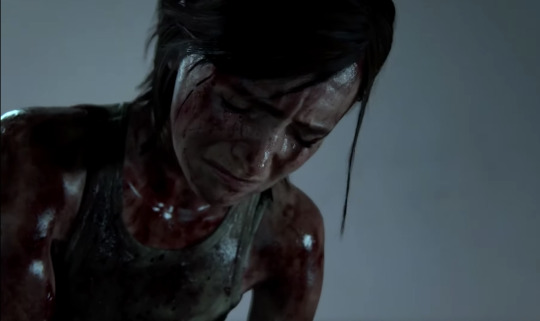
And she falters, she releases Abby.
Ellie continued to seek vengeance, an outward action, rather than experience grief, which is an inward action. Revenge as the distraction. Grief as the unbelievably long, lonely process. Revenge may have been satisfying, but if Abby had been killed, what would happen next? Ellie would be sitting in the ocean, still wrought with grief, still unable to essentially face Joel’s memory (whether it’s the terrible memory of his death, or the good memories, or the memories where she pushed him away because of resentment).
When Ellie says to Abby, “Go. Just take him,” she’s talking about Abby taking Lev and making their getaway, but to me… it was the overarching summation, the metaphorical line that delved into the point of the entire story.
When Ellie says, “Go. Just take him”, she’s also talking about Joel.
The vast ocean in front of her represents the subconscious, the unknown, and death. Ellie is sitting in the water, facing the unknown, and inwardly, the grief she feels over losing Joel. When she releases Abby, she is releasing her desire for vengeance. It is a singular point in the story. Revenge is a goal, a mission– it’s what drove the story, especially from Ellie’s point of view. But… revenge is not really a process, it’s a cycle. Because as the story showed, one act of vengeance turns into another act, and then another. It is the serpent biting its own tail.
Abby’s cycle of revenge halted because of Lev.
Abby’s responsibility was altered by the presence of Lev. Lev tells Abby to stop just before Abby is about to kill Dina.
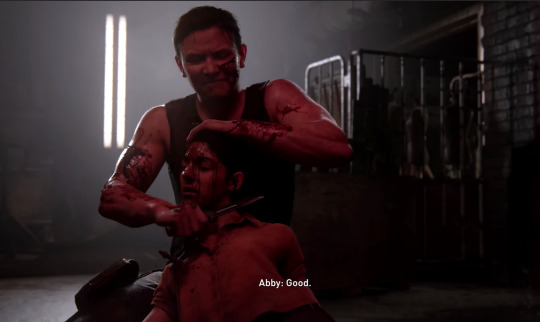
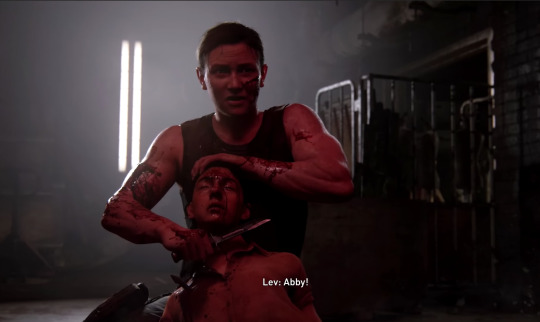
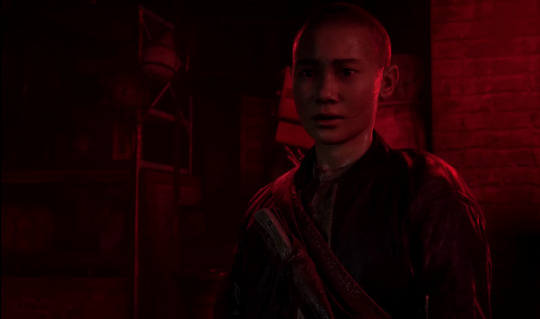

The music at this part slows from an adrenaline-fueled heartbeat. The hate and the rage lessen. Quiet takes over. The presence of Lev is what stopped her. This new-found purpose halts the cycle of revenge on Abby’s part. She is done.
Abby found new purpose and direction in her life because of Lev. Abby’s relationship with Lev is very similar to Joel’s relationship with Ellie in the first game. Joel found new purpose and meaning in his life with the arrival of Ellie. They even look similar to Joel and Ellie, I believe, in how Abby is clearly Lev’s protector, as Joel was Ellie’s protector in the first game:
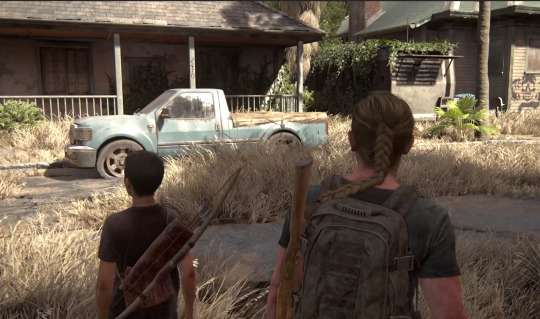
(Even the colors of their clothes resemble Ellie and Joel in the first game).
By the game’s end, Abby has found new purpose in her life just as Joel found new purpose in his through Ellie. As Joel said in the first game,
“I struggled for a long time with surviving. And you– No matter what, you keep finding something to fight for.”
Earlier, Abby and Owen are speaking outside the surgery room. Abby says that Yara and Lev are just kids, then she asks:

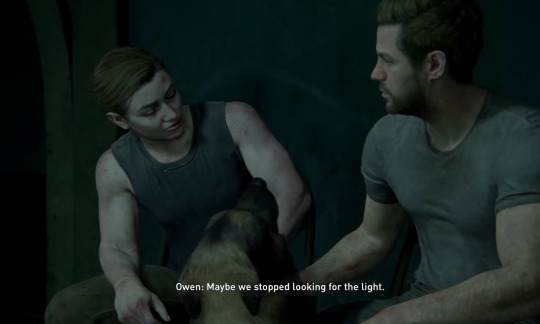
Abby found the light in Lev, a Seraphite, or “Scar”– she found the light in someone who would otherwise be her enemy.
Abby has a recurring dream, in which she’s walking down the hospital corridor towards the surgery room where her father was killed. It is her place of fear, her nightmare, and over and over it haunts her, replaying her pain and trauma.
After saving Yara and Lev, the dream changes. Her father is alive and smiling, almost as if this is his way of saying goodbye to her.
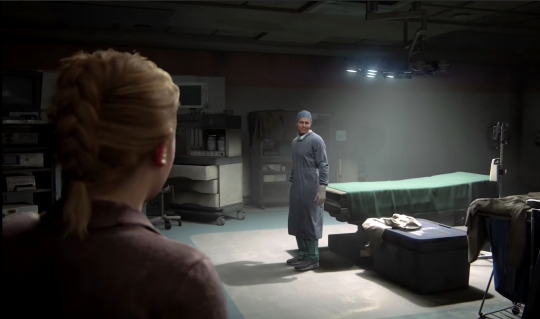
That is what’s crucial here– After Abby kills Joel and satiates her need for revenge, she still has the nightmare of her father’s death. Revenge did not reconcile her pain, it did not stop the nightmare– in fact, it only created guilt.
In the boat scene, Owen explains why he killed Danny. He describes how there was a Scar at a camp, and he was going to kill him. He describes how he hit the man on the head, hard, but he just laid there. He didn’t go for his weapon. He was an old man who was tired and ready.



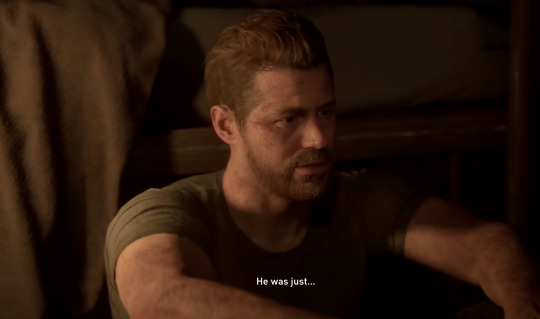

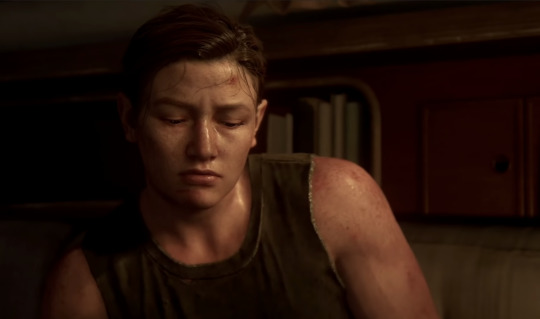
And something about that weakness, that human vulnerability, breaks Owen, and he can’t kill this old man. The cycle of revenge exhausts itself.
This story directly parallels Joel’s– he was an old man who was tired and ready.
In this same scene, Owen shames Abby for going after Joel. Mel does the same in a later scene, telling Abby that she’s a bad person. Abby’s group struggled with the action they took on Joel. Abby does too. Her reaction to Owen and Mel shaming her shows she feels guilt over what she did.
That guilt is reconciled with the arrival of Yara and Lev; particularly Lev, who becomes Abby’s responsibility later in the story.
By the same token, Ellie had that option with Dina and the baby. She could have shifted her direction in life towards her new family, but she chose not to– instead, she went after Abby a second time. It could be because she was overwhelmed by grief, or because her trauma felt unbearable. Maybe she was obsessed with the idea that revenge would alleviate the pain. Or maybe, she felt responsible for Joel’s death.
Ellie continued to move her life in the direction of vengeance, when really she needed to confront her own grief of losing him. And that takes time. That takes confrontation. The stagnation of “doing nothing” is not in Ellie’s character (for instance, Dina loses Jesse because Abby killed Jesse, but she does not seek revenge. She refocuses her life on her baby).
To contrast, Dina’s responsibility in life is to her child; Ellie’s responsibility in life is not necessarily to get revenge but to atone for her resentment towards Joel.
Ellie attempts to drown Abby as though it will bury the memories of Joel even more, but they surface regardless, one small droplet memory of Joel sitting on the porch with a guitar, and she can’t do it. She can’t continue the cycle of revenge.
After the final fight, Ellie looks out into the ocean, but there is no horizon. The fog covers it. There is no point, no “point on the horizon.” There is no point in continuing the cycle of revenge. As the poet John Ford wrote, “Revenge proves its own executioner.” Ellie was destroying herself as much as she was destroying her enemies.
I think... the reason Ellie had such difficulties dealing with her grief was because she felt responsible for Joel’s death in a roundabout way-- if she had died on the operating table, Joel would have never been a target, if she had never been immune, she would have turned when she was bitten-- and because she felt guilt, because she couldn’t accept their last conversation.
Which was so beautiful in its simplicity. Neither Ellie or Joel knew this would be their last conversation, and so there’s a sense of mundanity about it. It’s crucial but at the same time, not (because we as the players know this is their last conversation).
Ellie says she will consider forgiving him. The animosity Ellie felt towards Joel was not entirely resolved. And besides that, she had been giving him the silent treatment for over a year before that. She lost time with him because she held a grudge; the grudge is another reason she feels guilty. (Not saying Ellie’s grudge isn’t warranted. That’s what makes the situation so complicated and nuanced. She had a right to be mad because she wanted the vaccine, she was willing to sacrifice her life for it. So we see the difficulty she has in accepting Joel’s decision). Which spurred her on in her quest for revenge, while pushing aside the grief she felt.
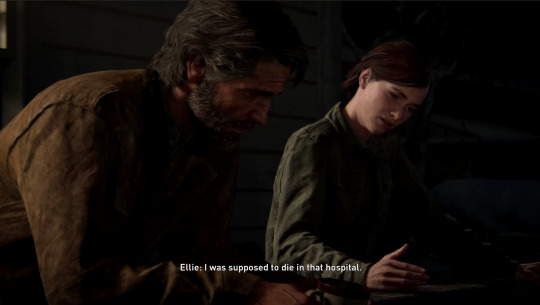
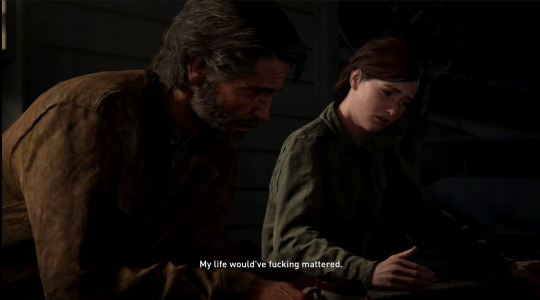


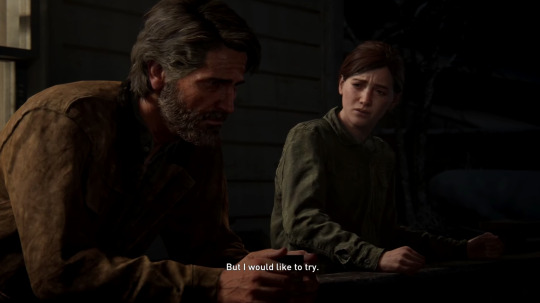
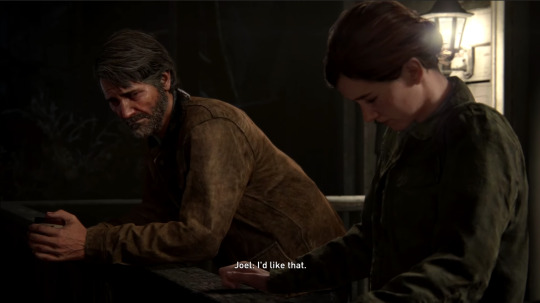
There is not point in continuing the cycle of revenge. Grief… it doesn’t necessarily have a “point” either, I don’t think. Like the ocean, it comes in waves. It soaks the body. It ebbs and flows, but it will lessen with time. As with Abby, who found a purpose in life by protecting Lev, Ellie has the option of finding a purpose in her life too– not the one she initially wanted, in which she sacrificed herself for a cure, but maybe one built with the same kind of love Joel felt for her.
But the process of grief means Ellie has to essentially, at one point, say to Death or the Unknown, Okay. You can take him. When she releases Joel, she is releasing so, so much more than what she would have gained from killing Abby.
At the game’s beginning, when Joel was dying, he looked at Ellie, and he smiled. There was something in his eyes that said he was glad, for everything, the pain, the struggle, the heartbreak, because in the end he’s looking at Ellie, and in the last crucial moment it’s as if he thinks, ‘It was worth it, for you’.
He knew the consequences of his actions when he stopped the Fireflies, when he stopped the cure from ever being made, and when he took Ellie from that hospital. He knew there was a risk involved, but at the game’s ending, during the flashback scene, he says, “If somehow the Lord gave me a second chance at that moment… I would do it all over again.”
(*Brief note: Interestingly enough, Abby is not explicitly seeking revenge on Joel because he prevented the cure from being made... she’s seeking revenge because he killed her father. It shows that in the grand scheme of things, what matters is the close relationships we form with others... that if Ellie had been the cure she would have been remembered as an almost “deified” concept, but Joel would have returned to the hopelessness of his own life. Abby didn’t enact revenge for humanity’s sake, she did it for her father. This ties in nicely with the ongoing war between the WLF and the Seraphites, and how each faction is a faceless mob until individuals like Yara and Lev meet Abby, or Owen has his emotional experience with the old man who was too tired to fight. Owen says he’s tired of fighting for land he doesn’t give a fuck about. It begs the question of what’s important in life... like the memories of Joel and Ellie exploring museums or Tommy and Ellie sharpshooting. It was the small, seemingly insignificant moments which mattered most, the moments Ellie remembered).
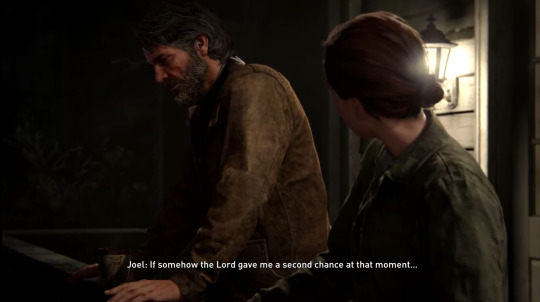

Joel died without regret. He died knowing that Ellie would be willing to forgive him. And even though their time of peace was brief, he died happy for the small moments they got to spend together, that for all the pain and suffering, in the end, it was worth it.

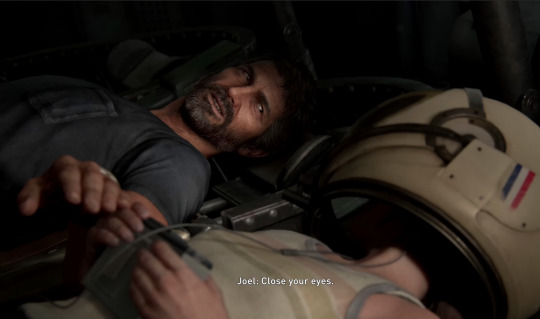
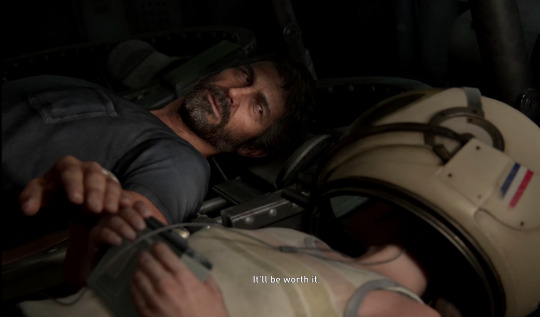
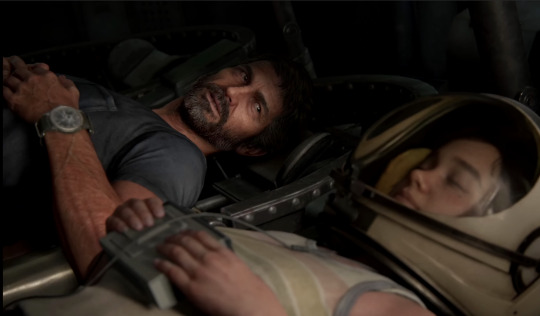
Ellie is angry at him because she believes her life would have mattered if she sacrificed herself for a vaccine. That there was a point to all the loss, for her best friend Riley’s death, for the numerous other deaths she witnessed in The Last of Us. When Joel took her from the hospital, it was selfish, but that’s because her life does matter, to him. Beyond being a cure, beyond being a martyr, Ellie as a human being matters to him. Yes, she would have been remembered as “the cure”, but only Joel would have remembered her as an actual human being: a person with habits, quirks, unique traits, vices and virtues.
He would do it again knowing how much she would resent him for it. I don’t know how else to describe that. I think it goes along the notion that, you don’t truly understand what it means to love someone more than anything, more than yourself, until you’ve had a child. With loss comes grief, then hope. Joel lost his daughter Sarah and suffered for years, but Ellie gave him hope. Abby lost her father, but found hope in Lev.
Ellie lost Joel, but what kind of hope returned to her at the story’s end?
When she returns to her home, Dina and the baby are gone. The house is empty, and all of Ellie’s belongings have been put into a single room. She goes there, and picks up the guitar Joel gave her.
Ellie lost two of her fingers, and now she’s unable to throughly play the guitar. The notes are disjointed, the melody is cracked. That is how Ellie is now. I’m not saying she’s a miserable broken wreck now– I’m saying she’s rough around the edges, she has a noticeable aura of fragmentation about her. Even if the grief lessens with time, she will be hardened by this pain. What she’s experienced has changed her and it’s a weight she’ll have to carry for the rest of her life. As the title suggest, she is the “last of us” regarding our journey throughout the game-- every emotion, every violent action, every loss and heartache-- Ellie is the bearer of it.
She places the guitar against the windowsill and leaves.

And you see that shot through the open window, Ellie leaving the house in the background, the guitar leaning against the windowsill in the foreground. I see that and I know, in one year the vines and weeds will start to take over the house like they do in all the abandoned houses. In two years the strings will rust and snap. In ten the guitar will become part of nature. Nature will come in through the window, and it will wrap itself around the guitar. The wood will crack and eventually it will disintegrate from the rain and wind.
The reason I think there’s an emblem of a moth on the guitar is because moths have very short lifespans (in their adult stage, they typically only live about one week). Because of the brevity of their life, and because they are night creatures, they are considered messengers of the unknown, or the “beyond.” Something not quite of this world, symbols of magic. But I think the more important part of the moth on the guitar is to show how brief Joel and Ellie’s time together was; how the lives of the characters in The Last of Us are often cut short, often without warning. In an even broader sense, life is brief, and time’s a thief, as the saying goes. The guitar in the last frame of the story was played for only a few years, and then, it has been left to the hands of time.
It’s here that we don’t really know what happens to Ellie: does she go in search of Dina? Does she go back to Jackson? Does she begin somewhere else, or will she live on her own for the rest of her days?
The uncertainty of her life from this point on leaves a bittersweet touch to the story. People move on, people leave. What is an old guitar weathered by the seasons, lost to time, was once a beautiful song shared between two people.
Joel, in saving her life, essentially gave her a chance at life. The rest is up to her.
#the last of us#the last of us part 2#the last of us part II#the last of us 2#tlou 2#joel miller#ellie williams#my posts
96 notes
·
View notes
Text
Mercutio is a Nonbinary Lesbian
So all the Jokes Aside about Mercutio actually being a Non-Binary Lesbian, nobody asked for it but i’m definitely gonna give you the proof, here is it, my completely canon compliant interpretation for Lesbian Mercutio*
*Ngl this interpretation mainly only holds up if we’re willing to do wlw Romeo and Juliet. It holds up less when they’re straights
Don’t believe me?
Btw, the version we’re performing is abridged so forgive me if the passages i’m citing are missing a line or two

^^Mercutio is the dancing queen, dancing is gay culture. Also, Pining is gay culture and Mercutio is obviously so not over her big gay crush on Romeo.
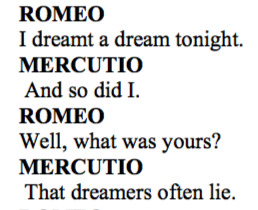
^Not just saying “I think you’re full of shit”, but also salty that Romeo’s so into this Roooosaline (ugh)
(Speaking of Romeo, like i said, pining is lesbian culture, Romeo is such a lesbian)
The Queen Mab speech: it is comical, but you can also read as very cynical and bitter.

Bitter that women are punished for desire

Once again, can be read as resentment, especially since the speech seems to pick up in intensity by the end. This part is talking about sex but also about bearing children. Lesbian Mercutio is super queer in the sense of rebelling against the heteronormative ideals of childbearing and marriage.
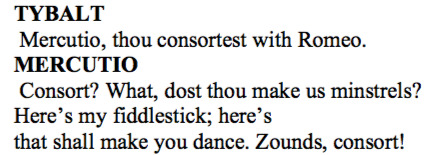
Mercutio disgusted that Straightboy like Tybalt would make a suggestive comment about the nature of her relationship to Romeo. Obviously, it stings even more because in reality, Romeo is just Not That Into Her.
(Also my favorite thing I learned giving the play a re-read is that Mercutio makes fun of Tybalt for being a Normie who adheres to popular fashion trends so this just proves my point of Lesbian Disaster Mercutio even more)

This is my favorite line and the most obvious one to me to lend itself to the interpretation because to me it reads:
Men are going to objectify me no matter what I do, so fuck it
Men are going to leer at me for being a weird lesbo freak no matter what i do, so again, fuck it
Who cares what men think, I was not made for a man’s consumption

Mercutio’s reaction to Romeo refusing to engage with Tybalt. She’s frustrated with Romeo’s “submission” to a man, but also as frustrated as she is w Romeo, I think the more important part is that she’s enraged at Tybalt’s show of aggression towards Romeo--who is her good friend and another wlw
Additionally, I feel like Mercutio is often positioned as a foil to Romeo as the cynic to Romeo’s idealist, but I think Lesbian Mercutio functions just as well as a foil for Juliet. Juliet is particular is fucked over by the patriarchy again and again, by her father who dictates she marries a near complete stranger at age 13, and by the friar who thinks he can fix everything and eventually fucks everything up. (This is very common in Shakespeare; the plays in which women are denied agency by the male figures are often tragedies). And then the play ends with the prince & the friar, patriarchs “fixing” the problem by build a statue in Romeo and Juliet’s honor, whatever.
While Juliet is trying desperately to cling to her own agency by the skin of her teeth, there’s no parental figure in sight for Mercutio. The closest knowledge we get is that Mercutio is related to the Prince.
And this is about to get a little reach-y, but I think the contrast would be between Juliet who is controlled vs. Mercutio who has no control. Who refuses to be controlled.
And there’s a real fear of stagnation, a helplessness because what is there for her? But at least Romeo and Juliet have each other, they were able to love in an environment of hatred, and Mercutio just has herself. Mercutio’s age is not given in the text, but I imagine he’s closer to Romeo’s 16 than to Juliet’s 13.
And yes, my reading is highly selective. The version we’re putting on is very stripped, much of Mercutio’s dialogue is cut for running time and decency, but removing his more crude jokes as women’s expense honestly strengthens my reading even more. Because canonical Mercutio mocks women, but a lesbian Mercutio? She KNOWS that womanhood can be kind of traumatic in general, she’s felt that, she’s seen that. Lady Capulet got married young to a stranger, Juliet was going to marry young to a stranger, Mercutio’s fear is that she could be next.
And the fact that she and her two best friends are all closet gnc wlw? Makes existing even harder. oh yeah you thought i wasn’t gonna mention Benvolio in this well you’re wrong and if you thought she was gonna escape the gay you’re wrong again, Benvolio? Not a lesbian? Benvolio? Repressed Pining Useless Lesbian Benvolio? Don’t you know gays come in sets? We’re like herds of cats
She wants to alienate herself from that experience, become nothing almost. Why can’t I just act as crass and crude as possible? I’ll pretend I’m a cishet white male, they face no consequences for their actions! But she can’t distance herself because while I’d never call Mercutio a protector of women she will fight for her friend. Her fight with Tybalt is pointless and reckless and stupid, yess, but it’s tragic, and fueled by rage, and she will fight anyone that talks to Romeo the way Tybalt does.
28 notes
·
View notes